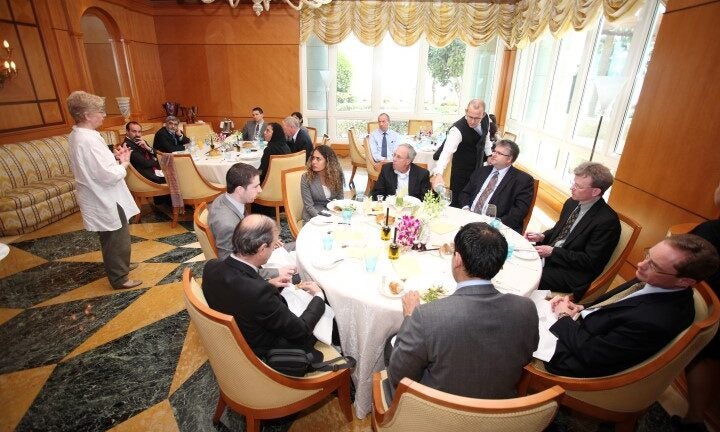Dialogue Series, Regional Studies
Paula Newberg on Moving Pakistan and Afghanistan Away from War

The Director of the Institute for the Study of Diplomacy at Georgetown University in Washington DC, Paula Newberg, gave a lunch lecture on March 11, 2010 titled “Reconciling Past and Future: Moving Pakistan and Afghanistan Away from War?” to a group of Qatar-based diplomats and Georgetown University in Qatar faculty and staff.
Newberg’s talk focused on the current situations in both Pakistan and Afghanistan and how best to overcome their shared political instabilities. Under the patronage of presidents Zardari and Karzai, Pakistan and Afghanistan have recently become engaged in renewed discussions about short-term and longer-term prospects for peace. Both presidents have their own interests in trying to re-establish some sense of peace in the region, primarily for their own countries. Newberg explained that although Pakistan and Afghanistan’s relationship to one another has been relatively fraught, both are now confronted with the common problem of extremism. But, she warned, although there is agreement that this is a critical issue, what counts as “extremism” is different for both countries. Newberg argued that, in this situation, “violence breeds nothing less or more than uncertainty.” Extremists, she noted, have become very agile, flexible, and sophisticated at how to keep all parties insecure and uncertain. When attacks happen, people in both countries assume that government is responsible for the volatile condition of the state.
In attempting to solve their internal political problems, Newberg noted that Pakistan and Afghanistan also have very different ideas about what constitutes an appropriate form of intervention. Both countries do, however, agree that one common problem is one of resources. There is the common belief, therefore, that either an injection of money or military might will reduce the volatility taking root in both countries. Newberg noted that, historically, neither of these resources has had the desired effect on the region. The problems these countries face are so entrenched in territorial and regional disputes, and questions about the efficacy of their respective sovereignties, that foreign assistance will not be able to solve them.
Words such as “reconciliation and reintegration” have been introduced into the political discourses of both countries. Newberg argued that there are tens of thousands of NATO forces aided by a small number of Afghan forces attempting to control and reintegrate a small but agile enemy in the form of the Taliban. However, she said, this strategy is difficult to maintain: many citizens of both countries believe that reconciliatory policies suggest that outlawed factions can be legitimized, whether as opponents or allies. Newberg noted that “if you have, like in Afghanistan, a very weak state with a very weak government, then it is almost as if the so-called enemy of the state has determined that they are strong enough to be considered rightful negotiators.”
Newberg concluded the lecture by noting that, in order to set about true political change, there needs to be serious strategic reforms in the structures of both countries, especially in Pakistan. She argued that “Pakistan, more than almost any of the former British colonies, has hewed into a state structure that so much resembles what it inherited from the British that it becomes almost useless for a modernizing, rapidly-growing, proto-industrial society.” Pakistan, Newberg explained, still relies on a centralized system, where the budget is organized from the center and then devolves to the provinces in an inequitable manner. She argued that “this means that some people’s citizenship is devalued and other people’s citizenship is overvalued.” The only way to change this is to reconfigure the structure of governance in the country by introducing an equitable taxation system and building local governances from the bottom up. Newberg concluded that until such time that this structure is altered, problems of governance and foreign policy will be replicated, over and again.
Paula R. Newberg is the Marshall B. Coyne Director of the Institute for the Study of Diplomacy (ISD). A scholar and practitioner with wide-ranging experience in multilateral and nongovernmental organizations. Dr. Newberg specializes in issues of democracy, human rights, and development in crisis and transition states, and has served as a Special Advisor to the United Nations in various regions, including multiple postings in Afghanistan. Dr. Newberg was a senior associate position at the Carnegie Endowment for International Peace, where she co-founded its Democracy Project and chaired the South Asia Roundtable, and was a Guest Scholar at the Brookings Institution.
A former foundation executive, Dr. Newberg taught at the School of International and Public Affairs at Columbia University for many years, and publishes extensively on issues including law and constitutionalism in Pakistan, insurgency and human rights in Kashmir, and international assistance to war-torn Afghanistan. A graduate of Oberlin College, Newberg received her doctorate in political science from the University of Chicago.
Article by Suzi Mirgani. Mirgani is CIRS Publications Coordinator.